Clinical Reflective Activity PDF
VerifiedAdded on 2022/08/15
|5
|969
|13
AI Summary
Contribute Materials
Your contribution can guide someone’s learning journey. Share your
documents today.
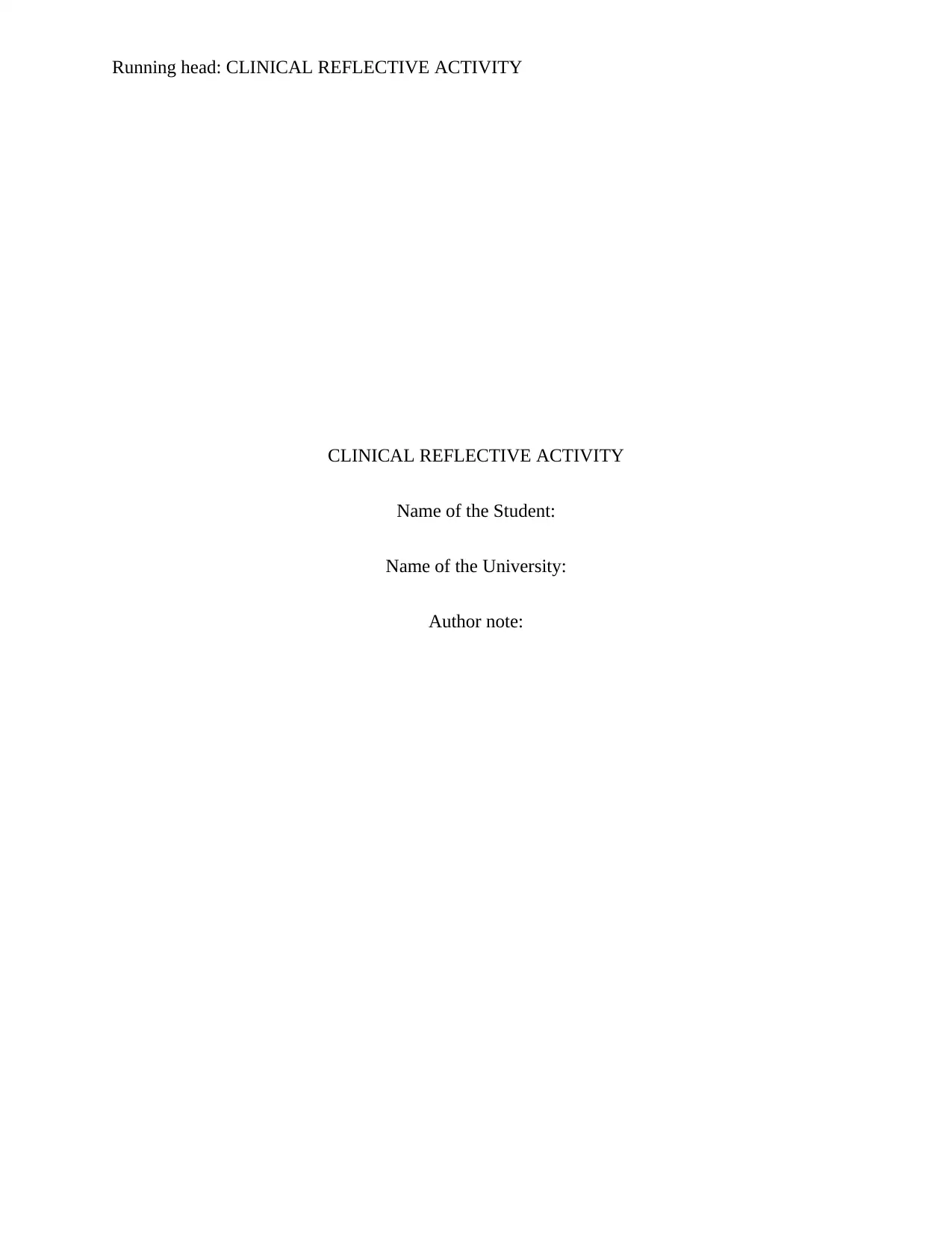
Running head: CLINICAL REFLECTIVE ACTIVITY
CLINICAL REFLECTIVE ACTIVITY
Name of the Student:
Name of the University:
Author note:
CLINICAL REFLECTIVE ACTIVITY
Name of the Student:
Name of the University:
Author note:
Secure Best Marks with AI Grader
Need help grading? Try our AI Grader for instant feedback on your assignments.
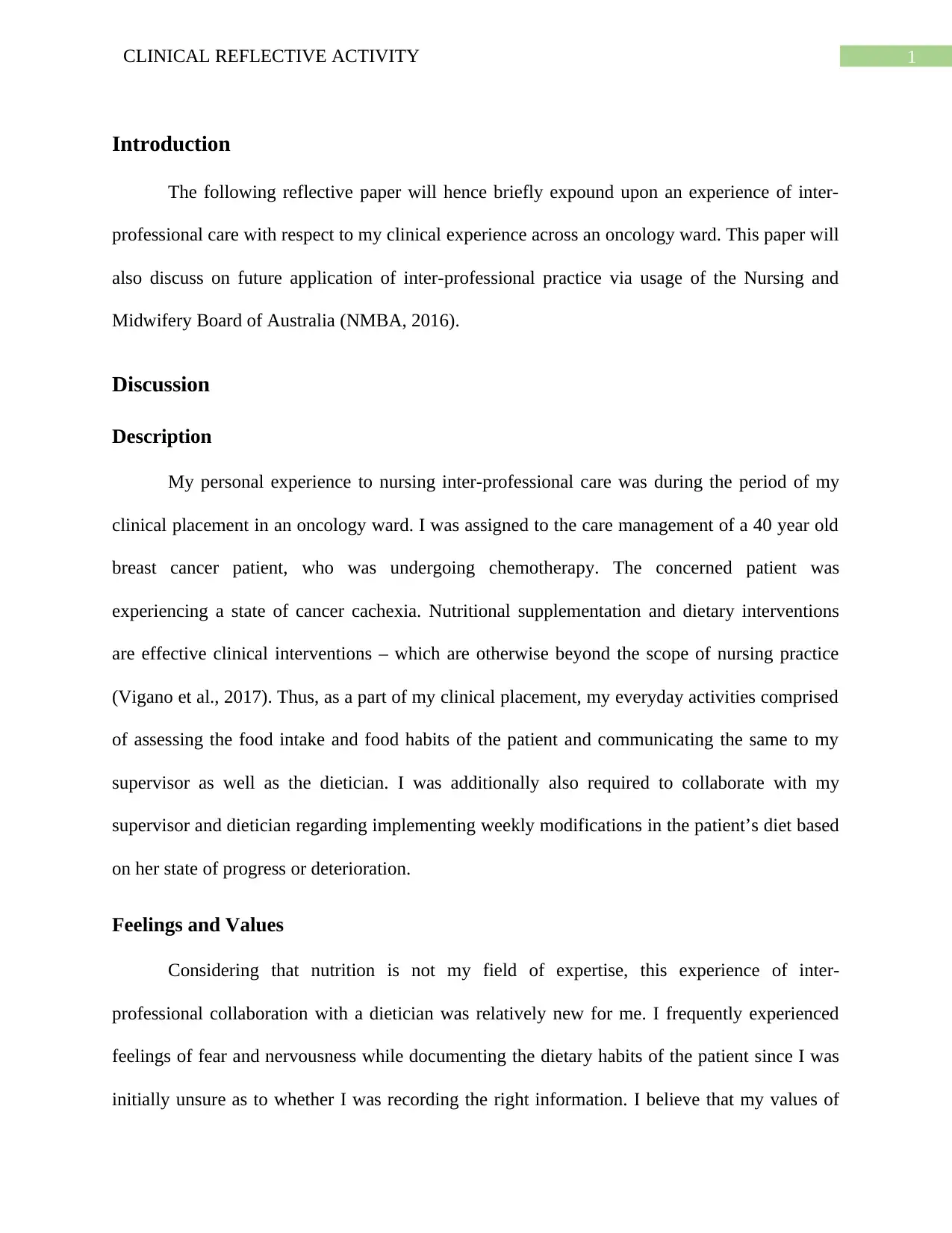
1CLINICAL REFLECTIVE ACTIVITY
Introduction
The following reflective paper will hence briefly expound upon an experience of inter-
professional care with respect to my clinical experience across an oncology ward. This paper will
also discuss on future application of inter-professional practice via usage of the Nursing and
Midwifery Board of Australia (NMBA, 2016).
Discussion
Description
My personal experience to nursing inter-professional care was during the period of my
clinical placement in an oncology ward. I was assigned to the care management of a 40 year old
breast cancer patient, who was undergoing chemotherapy. The concerned patient was
experiencing a state of cancer cachexia. Nutritional supplementation and dietary interventions
are effective clinical interventions – which are otherwise beyond the scope of nursing practice
(Vigano et al., 2017). Thus, as a part of my clinical placement, my everyday activities comprised
of assessing the food intake and food habits of the patient and communicating the same to my
supervisor as well as the dietician. I was additionally also required to collaborate with my
supervisor and dietician regarding implementing weekly modifications in the patient’s diet based
on her state of progress or deterioration.
Feelings and Values
Considering that nutrition is not my field of expertise, this experience of inter-
professional collaboration with a dietician was relatively new for me. I frequently experienced
feelings of fear and nervousness while documenting the dietary habits of the patient since I was
initially unsure as to whether I was recording the right information. I believe that my values of
Introduction
The following reflective paper will hence briefly expound upon an experience of inter-
professional care with respect to my clinical experience across an oncology ward. This paper will
also discuss on future application of inter-professional practice via usage of the Nursing and
Midwifery Board of Australia (NMBA, 2016).
Discussion
Description
My personal experience to nursing inter-professional care was during the period of my
clinical placement in an oncology ward. I was assigned to the care management of a 40 year old
breast cancer patient, who was undergoing chemotherapy. The concerned patient was
experiencing a state of cancer cachexia. Nutritional supplementation and dietary interventions
are effective clinical interventions – which are otherwise beyond the scope of nursing practice
(Vigano et al., 2017). Thus, as a part of my clinical placement, my everyday activities comprised
of assessing the food intake and food habits of the patient and communicating the same to my
supervisor as well as the dietician. I was additionally also required to collaborate with my
supervisor and dietician regarding implementing weekly modifications in the patient’s diet based
on her state of progress or deterioration.
Feelings and Values
Considering that nutrition is not my field of expertise, this experience of inter-
professional collaboration with a dietician was relatively new for me. I frequently experienced
feelings of fear and nervousness while documenting the dietary habits of the patient since I was
initially unsure as to whether I was recording the right information. I believe that my values of
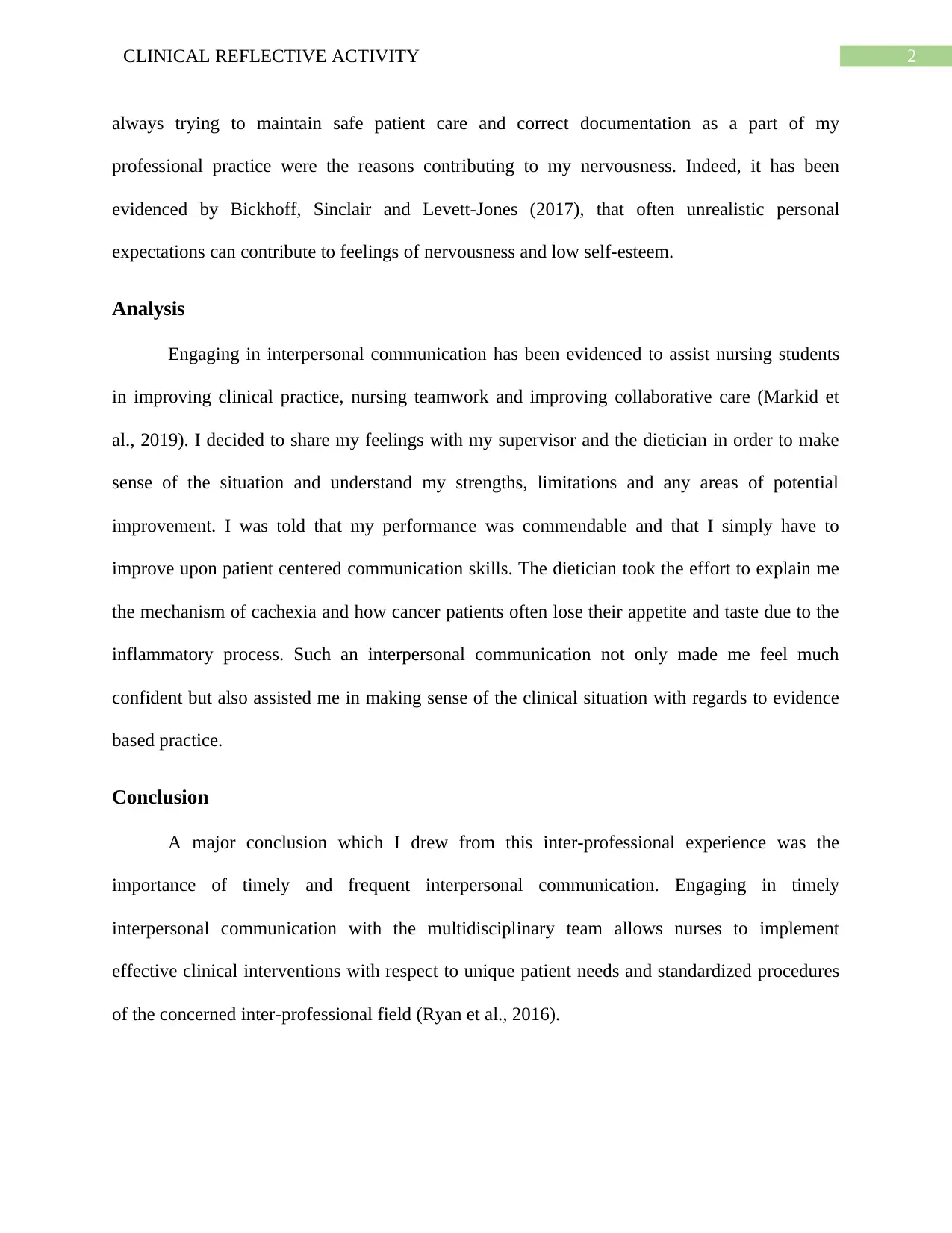
2CLINICAL REFLECTIVE ACTIVITY
always trying to maintain safe patient care and correct documentation as a part of my
professional practice were the reasons contributing to my nervousness. Indeed, it has been
evidenced by Bickhoff, Sinclair and Levett-Jones (2017), that often unrealistic personal
expectations can contribute to feelings of nervousness and low self-esteem.
Analysis
Engaging in interpersonal communication has been evidenced to assist nursing students
in improving clinical practice, nursing teamwork and improving collaborative care (Markid et
al., 2019). I decided to share my feelings with my supervisor and the dietician in order to make
sense of the situation and understand my strengths, limitations and any areas of potential
improvement. I was told that my performance was commendable and that I simply have to
improve upon patient centered communication skills. The dietician took the effort to explain me
the mechanism of cachexia and how cancer patients often lose their appetite and taste due to the
inflammatory process. Such an interpersonal communication not only made me feel much
confident but also assisted me in making sense of the clinical situation with regards to evidence
based practice.
Conclusion
A major conclusion which I drew from this inter-professional experience was the
importance of timely and frequent interpersonal communication. Engaging in timely
interpersonal communication with the multidisciplinary team allows nurses to implement
effective clinical interventions with respect to unique patient needs and standardized procedures
of the concerned inter-professional field (Ryan et al., 2016).
always trying to maintain safe patient care and correct documentation as a part of my
professional practice were the reasons contributing to my nervousness. Indeed, it has been
evidenced by Bickhoff, Sinclair and Levett-Jones (2017), that often unrealistic personal
expectations can contribute to feelings of nervousness and low self-esteem.
Analysis
Engaging in interpersonal communication has been evidenced to assist nursing students
in improving clinical practice, nursing teamwork and improving collaborative care (Markid et
al., 2019). I decided to share my feelings with my supervisor and the dietician in order to make
sense of the situation and understand my strengths, limitations and any areas of potential
improvement. I was told that my performance was commendable and that I simply have to
improve upon patient centered communication skills. The dietician took the effort to explain me
the mechanism of cachexia and how cancer patients often lose their appetite and taste due to the
inflammatory process. Such an interpersonal communication not only made me feel much
confident but also assisted me in making sense of the clinical situation with regards to evidence
based practice.
Conclusion
A major conclusion which I drew from this inter-professional experience was the
importance of timely and frequent interpersonal communication. Engaging in timely
interpersonal communication with the multidisciplinary team allows nurses to implement
effective clinical interventions with respect to unique patient needs and standardized procedures
of the concerned inter-professional field (Ryan et al., 2016).
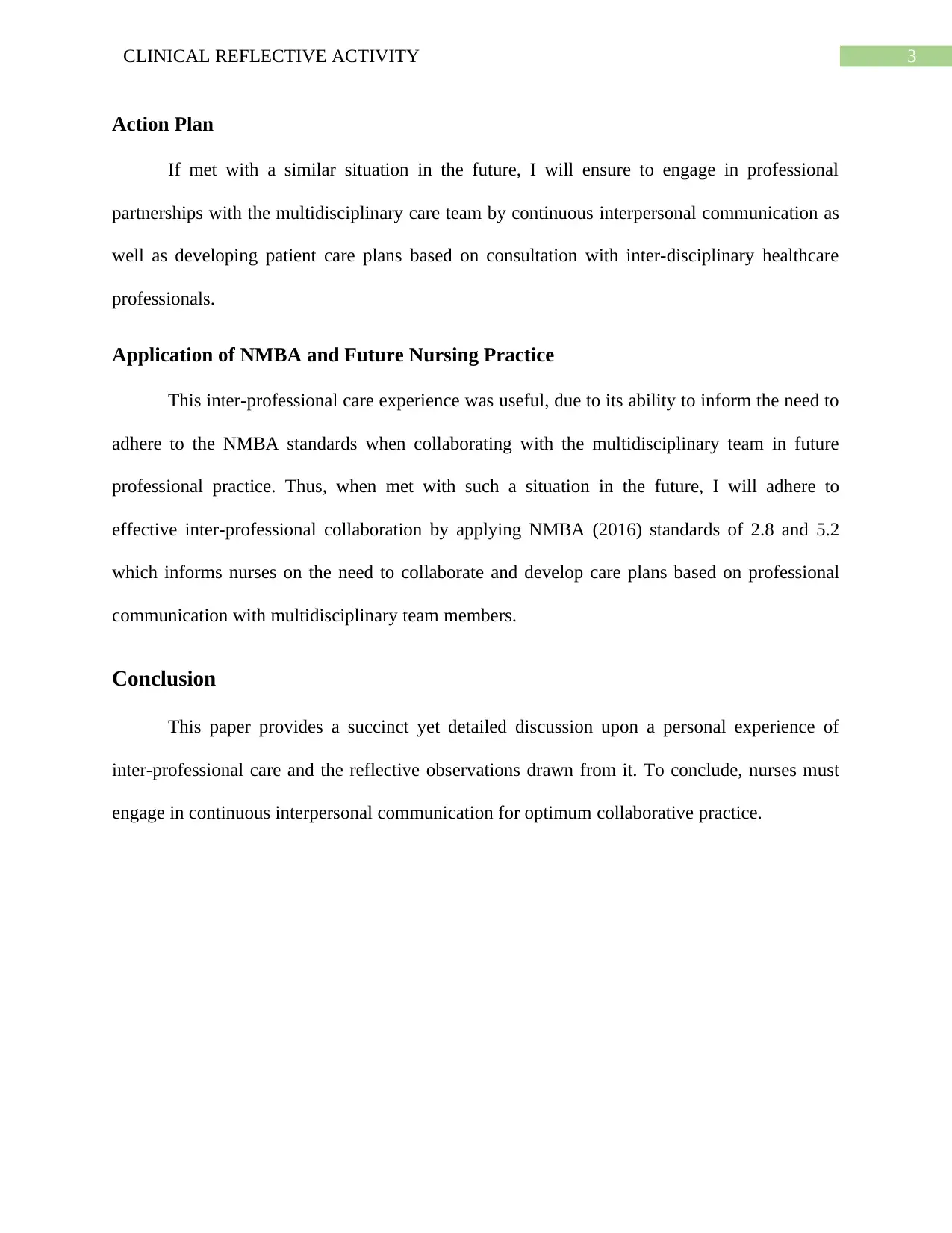
3CLINICAL REFLECTIVE ACTIVITY
Action Plan
If met with a similar situation in the future, I will ensure to engage in professional
partnerships with the multidisciplinary care team by continuous interpersonal communication as
well as developing patient care plans based on consultation with inter-disciplinary healthcare
professionals.
Application of NMBA and Future Nursing Practice
This inter-professional care experience was useful, due to its ability to inform the need to
adhere to the NMBA standards when collaborating with the multidisciplinary team in future
professional practice. Thus, when met with such a situation in the future, I will adhere to
effective inter-professional collaboration by applying NMBA (2016) standards of 2.8 and 5.2
which informs nurses on the need to collaborate and develop care plans based on professional
communication with multidisciplinary team members.
Conclusion
This paper provides a succinct yet detailed discussion upon a personal experience of
inter-professional care and the reflective observations drawn from it. To conclude, nurses must
engage in continuous interpersonal communication for optimum collaborative practice.
Action Plan
If met with a similar situation in the future, I will ensure to engage in professional
partnerships with the multidisciplinary care team by continuous interpersonal communication as
well as developing patient care plans based on consultation with inter-disciplinary healthcare
professionals.
Application of NMBA and Future Nursing Practice
This inter-professional care experience was useful, due to its ability to inform the need to
adhere to the NMBA standards when collaborating with the multidisciplinary team in future
professional practice. Thus, when met with such a situation in the future, I will adhere to
effective inter-professional collaboration by applying NMBA (2016) standards of 2.8 and 5.2
which informs nurses on the need to collaborate and develop care plans based on professional
communication with multidisciplinary team members.
Conclusion
This paper provides a succinct yet detailed discussion upon a personal experience of
inter-professional care and the reflective observations drawn from it. To conclude, nurses must
engage in continuous interpersonal communication for optimum collaborative practice.
Secure Best Marks with AI Grader
Need help grading? Try our AI Grader for instant feedback on your assignments.
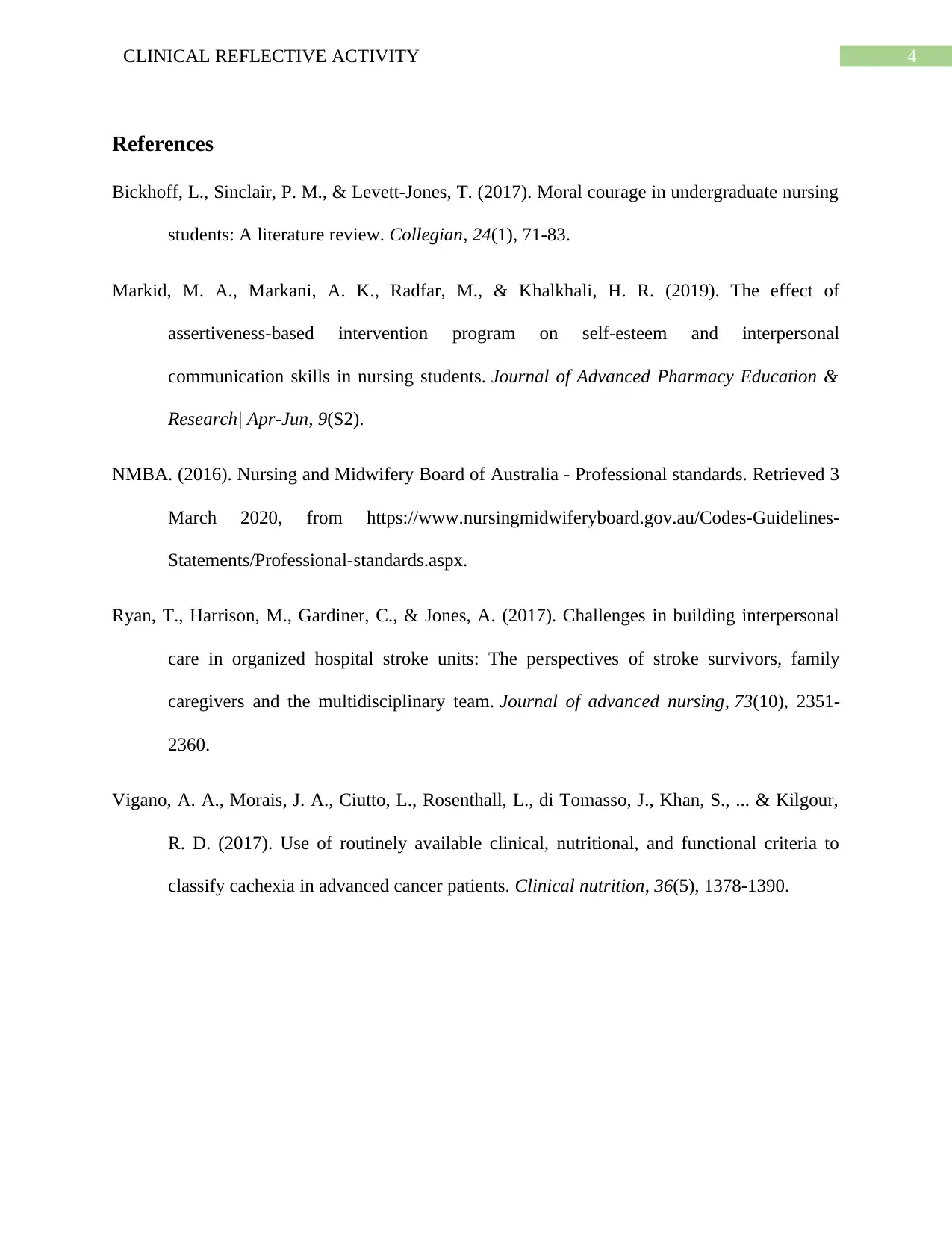
4CLINICAL REFLECTIVE ACTIVITY
References
Bickhoff, L., Sinclair, P. M., & Levett-Jones, T. (2017). Moral courage in undergraduate nursing
students: A literature review. Collegian, 24(1), 71-83.
Markid, M. A., Markani, A. K., Radfar, M., & Khalkhali, H. R. (2019). The effect of
assertiveness-based intervention program on self-esteem and interpersonal
communication skills in nursing students. Journal of Advanced Pharmacy Education &
Research| Apr-Jun, 9(S2).
NMBA. (2016). Nursing and Midwifery Board of Australia - Professional standards. Retrieved 3
March 2020, from https://www.nursingmidwiferyboard.gov.au/Codes-Guidelines-
Statements/Professional-standards.aspx.
Ryan, T., Harrison, M., Gardiner, C., & Jones, A. (2017). Challenges in building interpersonal
care in organized hospital stroke units: The perspectives of stroke survivors, family
caregivers and the multidisciplinary team. Journal of advanced nursing, 73(10), 2351-
2360.
Vigano, A. A., Morais, J. A., Ciutto, L., Rosenthall, L., di Tomasso, J., Khan, S., ... & Kilgour,
R. D. (2017). Use of routinely available clinical, nutritional, and functional criteria to
classify cachexia in advanced cancer patients. Clinical nutrition, 36(5), 1378-1390.
References
Bickhoff, L., Sinclair, P. M., & Levett-Jones, T. (2017). Moral courage in undergraduate nursing
students: A literature review. Collegian, 24(1), 71-83.
Markid, M. A., Markani, A. K., Radfar, M., & Khalkhali, H. R. (2019). The effect of
assertiveness-based intervention program on self-esteem and interpersonal
communication skills in nursing students. Journal of Advanced Pharmacy Education &
Research| Apr-Jun, 9(S2).
NMBA. (2016). Nursing and Midwifery Board of Australia - Professional standards. Retrieved 3
March 2020, from https://www.nursingmidwiferyboard.gov.au/Codes-Guidelines-
Statements/Professional-standards.aspx.
Ryan, T., Harrison, M., Gardiner, C., & Jones, A. (2017). Challenges in building interpersonal
care in organized hospital stroke units: The perspectives of stroke survivors, family
caregivers and the multidisciplinary team. Journal of advanced nursing, 73(10), 2351-
2360.
Vigano, A. A., Morais, J. A., Ciutto, L., Rosenthall, L., di Tomasso, J., Khan, S., ... & Kilgour,
R. D. (2017). Use of routinely available clinical, nutritional, and functional criteria to
classify cachexia in advanced cancer patients. Clinical nutrition, 36(5), 1378-1390.
1 out of 5
Related Documents
Your All-in-One AI-Powered Toolkit for Academic Success.
+13062052269
info@desklib.com
Available 24*7 on WhatsApp / Email
![[object Object]](/_next/static/media/star-bottom.7253800d.svg)
Unlock your academic potential
© 2024 | Zucol Services PVT LTD | All rights reserved.





